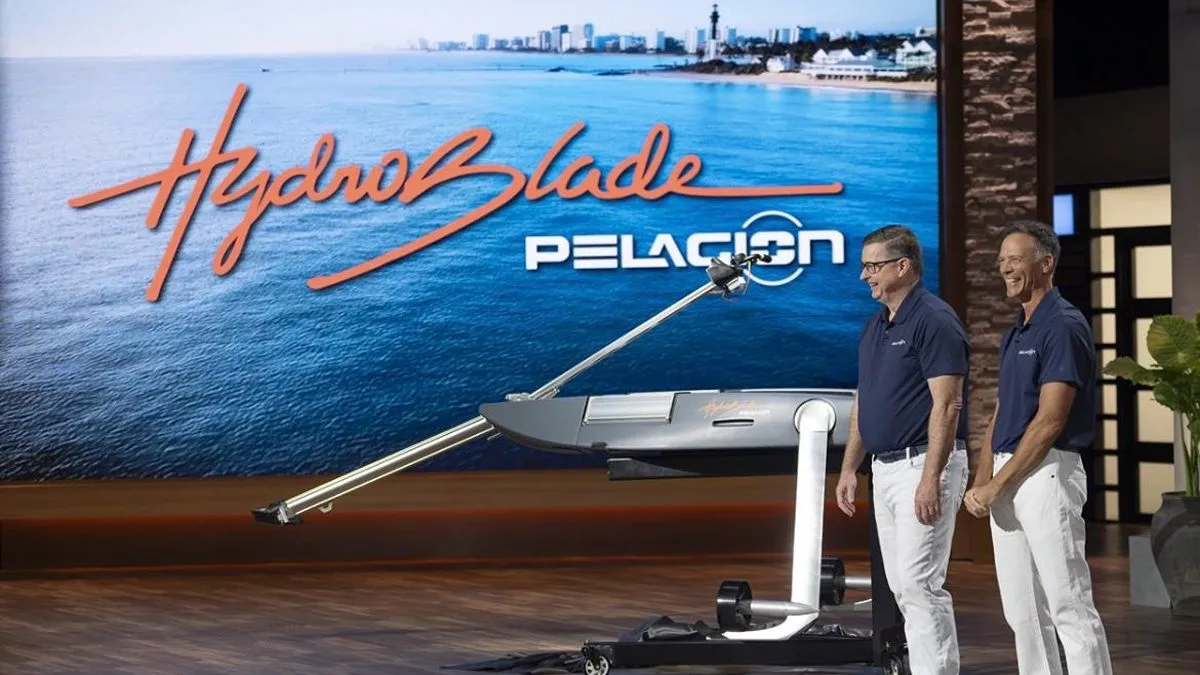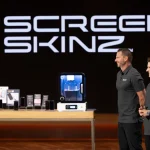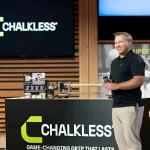
When Shark Tank Season 17 Episode 1 aired, fans were excited for the mix of quirky and tense pitches, negotiations, and dramatic deals. Episode 1 delivered socks, pain-relief spring-attached shoes, and low ABV craft beer, all hitting the stage.
However, it was the futuristic watercraft HydroBlade brand, Pelagion, that hogged the limelight. Not because of a jaw-dropping offer or a breakthrough deal, but because of an awkward clash with Kevin O’Leary that left viewers debating: Did the Pelagion founders sink their own deal with their attitude?
This article breaks down what happened during the pitch, why the Sharks weren’t biting, and what the episode reveals about the razor-thin line between confidence and arrogance in the Tank.
What is Pelagion?
Pelagion entered the Tank with undeniable flair. Founders Mike Terry and Jamie Schlinkmann rolled out their HydroBlade, a high-tech electric watercraft designed to give riders the thrill of “flying” across the water.
The product looked impressive on stage. Its futuristic design screamed “luxury toy for the adventurous elite.” The founders painted it as more than a water toy: a revolution in water sports.
They even talked about the environmentally friendly angle—an electric waterboard that produces zero gas emissions, aligning with the increasing demand for eco-friendly luxury tech.
At the start, it seemed like an appealing deal for the Sharks — tech, luxury, and sustainability. But under the surface, cracks were wide open.
The Ask and the Valuation
Pelagion came into the Tank asking for a significant sum at a lofty valuation. Reports estimate the valuation in the multimillion-dollar range, though exact numbers vary depending on post-show recaps. That alone set the Sharks on edge.
High valuations aren’t unusual on Shark Tank, but they require either proven traction or a revolutionary market advantage.
When the founders started explaining their business model, it became clear that Pelagion wasn’t mass-market ready. The HydroBlade came with a high price tag, production costs were steep, and scaling manufacturing to meet potential demand would require enormous capital.
Mark Cuban and Lori Greiner, in particular, pressed on the scalability problem: How do you go from flashy prototype to nationwide distribution? The answers felt vague. The founders were visionaries, but they didn’t seem prepared with grounded, scalable strategies.
Questions from Kevin O’Leary
If there’s one Shark who has little patience for grand visions without numbers, it’s Kevin O’Leary. Known as “Mr. Wonderful,” Kevin often positions himself as the harshest realist in the room.
As the Pelagion pitch wore on, Kevin began poking holes in the business:
- The market size: How many people are really going to buy a $15,000+ luxury watercraft?
- The margins: With high production costs, where’s the profit?
- The scale: Can this move beyond being a niche luxury toy?
When Kevin called the product more of a “rich man’s toy” than a scalable business, the tension spiked. Rather than deflect gracefully, one of the Pelagion founders snapped back. The tone was sharp; some viewers saw confidence, others saw arrogance.
That exchange became the viral moment of the episode.
The Clash: Confidence vs. Arrogance
Here’s the tricky balance every founder faces in the Tank:
- Confidence shows belief in your product.
- Arrogance alienates potential investors.
The Pelagion founders clearly believed in their vision. They defended their HydroBlade passionately. But when Kevin pressed too hard, they fired back with a tone that felt dismissive of his concerns. Instead of leaning into Kevin’s critique and reframing the value, they doubled down on the dream.
For Shark Tank fans, this was déjà vu. Over the years, dozens of founders have lost deals not because of their product, but because of their attitude in the room. The Sharks are investors, but they’re also people—people who expect respect, coachability, and humility.
As the clash unfolded, it was clear: whatever chance Pelagion had at winning Kevin over was gone.
Why the Sharks Walked Away
The clash with Kevin may have been the headline moment, but there were deeper reasons the Sharks passed:
- High Price Point: The HydroBlade’s luxury cost immediately limited its customer base. Sharks prefer businesses that can scale broadly; Pelagion felt more like a boutique novelty.
- Unclear Path to Scale: Manufacturing electric watercraft at scale requires huge upfront investment, supply chain reliability, and regulatory hurdles. None of these challenges was addressed convincingly.
- Unproven Demand: Beyond a handful of prototypes and test rides, Pelagion didn’t have the traction or pre-orders to justify its sky-high valuation
- Founder Dynamic: The tension with Kevin left a bad taste. If a founder is combative with investors on national TV, how will they handle boardroom negotiations, production crises, or customer complaints?
Barbara Corcoran summed it up bluntly: Pelagion was a dream, not an investable business.
Why This Moment Became Season 17 Episode 1’s Drama
Every Shark Tank premiere needs a flashpoint—a moment that hooks viewers and trends online. Pelagion delivered that in spades. The visual spectacle of the HydroBlade drew eyes, but the real buzz came from the awkward clash. One X user even wrote, ‘Kevin was harsh, but they came off as too cocky.”
Fans on social media split into two camps:
- Team Pelagion: Applauding the founders for standing up to Kevin’s “rudeness” and refusing to let him dismiss their vision.
- Team Kevin: Criticizing the founders for being defensive and failing to take constructive criticism like professionals.
Either way, it got people talking. And in reality TV, conversation equals ratings.
Lessons for Entrepreneurs
The Pelagion saga in Season 17, Episode 1, offers some enduring lessons for anyone pitching investors—or even selling an idea to a client or boss.
1. Numbers > Vision
Investors want to hear about sales, margins, and demand—not just dreams. Vision is important, but without grounded financials, it sounds hollow.
2. Respect the Critique
Even if an investor is harsh, resist the urge to get defensive. Instead, pivot: “That’s a fair concern. Here’s how we’re addressing it.” Investors want coachability.
3. Know Your Market
If your product is niche, own it—but don’t pretend it’s mass-market. Sharks hate being sold fantasies.
4. Tone Matters
A single sharp response can undo minutes of goodwill. In the Tank, body language and tone are as important as your pitch deck.
5. Media Optics Are Everything
Remember that Shark Tank is both a pitch room and a television show. Founders who appear likeable, humble, and adaptable often win audience sympathy, even if they don’t get a deal. That goodwill can sometimes matter more than a Shark’s investment.
So… Did They Sink Their Own Deal?
In a word: yes. Pelagion’s challenges—high costs, unclear scalability, limited demand, and being high capital-intensive—already made it a tough sell. But the clash with Kevin and Kendra’s statement after that sealed the Sharks’ disinterest. A more receptive response, humility, and an open mind to critique might not have sealed the deal, but it would have definitely kept the deal wide open for the coming years.
Instead, the founders were overly defensive, leaving Sharks with a first impression that they aren’t just investing in a capital-intensive and risky product—they’d be investing in combative personalities. In the end, Pelagion walked out with no offers.




















